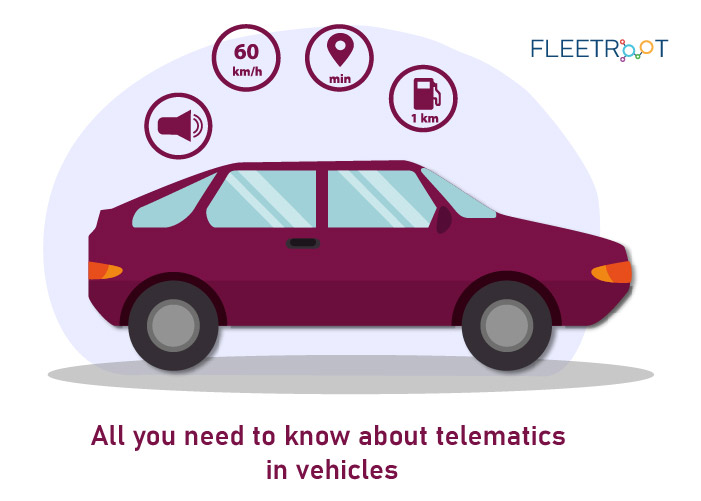Vehicle telematics has numerous applicable benefits for drivers everywhere. It helps boost vehicle safety and saves time and money for businesses. Telematics integrates communication, navigation, and security into a single appropriate piece of technology that fits the dashboard.
In this post, we will explain everything you need to know about vehicle telematics, including:
- Introduction to telematics
- Reasons to install a telematics device
- Benefits of telematics
- Telematics services
Introduction to telematics
The term “telematics” is the integration of words “telecommunications” and “informatics.” The use of GPS and communication systems helps telematics offer multiple information and services.
Companies can use telematics for data collection using sensors, GPS technology, and other diagnostics codes. Managed data includes driver behavior, vehicle location, vehicle activity, and real-time engine diagnostics. The technology is run on software platforms to help fleet managers handle their assets remotely.
Logistic companies will place telematics devices and related software devices to fetch and transfer a wide range of information. The data in the installed device might include:
- Vehicle location and maintenance information
- Vehicle’s hourly usage
- Vehicle faults
- Fuel consumption
- Excessive acceleration
- Hard braking
- Hard cornering
- Idling time
- Speeding
The information obtained and transmitted by the telematics device provides fleet owners with deeper insights beyond their whole fleet. These insights can be used for:
- Minimizing fuel waste and operating expenses
- Enhancing fleet safety
- Monitoring asset locations
- Proactively identifying maintenance issues
Reasons to install a telematics device?
Telematics is a crucial technology for fleet management. There are multiple reasons why fleet businesses should choose telematics:
- Safety: Here, options include driver behavior reporting, in-vehicle coaching, incident notification and reconstruction, and the potential to track stolen vehicles.
- Improved customer service: Using trip reporting, GPS tracking, and routing tools will enhance fleet productivity. It also cuts delivery time.
- Quality system: Using telematics, fleet managers and dispatchers can track their fleet to determine drivers’ arrival ideally.
- Trust Building: Vehicle telematics can help tell a customer the exact location of their consignment and reach quickly.
- Camera: Onboard camera integration technology can save the day by capturing the video proofs.
Benefits of telematics?
Reduced fuel costs. Telematics can help fleet owners plan better routes, detect extra fuel usage from equipment misuse and poor planning, and cut idle time.
Communication and data access. Telematics unravels the communication process by limiting the drivers’ need to check-in and report back to the fleet manager by process automation. It lets the drivers get more time to carry out their job and grow manager resources.
Safety. Telematics monitors driver behavior, equipment, and vehicle performance. In case of any incident, GPS tracking can provide emergency assistance to the location when required.
Productive maintenance. Telematics can alert managers of crucial mechanical problems, which allows them to solve the issue sooner, saving costly repairs and valuable downtime that could have been avoided. Managers can also make timely schedule maintenance, thus maximizing resources.
There are some additional benefits:
- Increased fleet productivity and efficiency
- Improved safety
- Inhibitory vehicle maintenance monitoring
- Driver exoneration in confuting tickets or citations and after collision
- Reduced fuel waste and operational expenses
- Optimized payroll management
- Automated IFTA reports
- Smooth communication between managers and drivers
What are fleet telematics services?
GPS tracking transmits information to and from a fleet’s computer system. It allows services such as GPS navigation, remote diagnostics, detailed fleet management, and roadside assistance.
The primary use of telematics service is to gather vehicle’s real-time data from multiple devices and modify it into an organized form to enable fleet owners to make informed business decisions. Driving data measurement may include road type, average vehicle speed, acceleration, hard braking, g-force, and the number of trips per day.
How can the Fleet telematics solution help?
Installing a telematics device into a vehicle may be more accessible. Fleet telematics solutions can help you with a manageable vehicle gateway installation guide. This guide can help you install your device and keep away from any possible issues.
The solution’s dashboard can send real-time message drivers through an app. Using telematics can help simplify the driver’s everyday workflow since they have a single interface for messaging and compliance. Driver safety is the priority, so messages won’t appear until the driver stops the vehicle.



